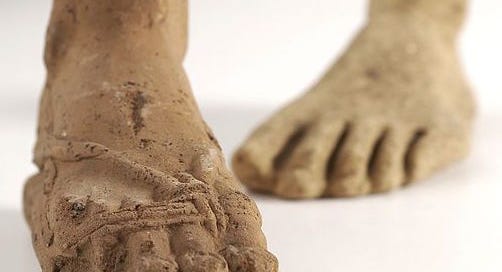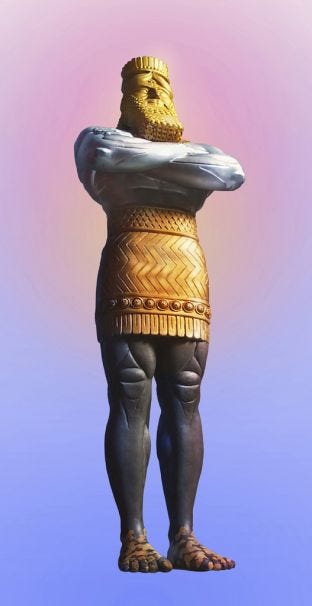The Book of Daniel has important lessons in living under a regime. Daniel experiences the entirety of predicted patient penance from the pages of Julius Evola, if you pause to ponder it. He sees his civilization crumbling. He knows he is about to be a man amongst the ruins. And after the siege of Jerusalem, he is sifted away to the courts of Nebuchadnezzar to be one of his captured elite of a foreign power. He is given a Babylonian name, told to eat and participate in Babylonian culture and sciences, and effectively deracinated and, although never explicitly stated, likely also (d)emasculated. Daniel never has a wife, nor takes interest in women. And Babylon was oft to promote slaves into leadership at the clamps of the loins.
Daniel, Babylonian Bugman, never left Babylon even when his future Persian Emperor permitted it. Daniel came to be at peace in his role; the in-between of generations. That before the Exile, and that after. His fathers fought in might wars and did might deeds. His next of kin, adopted or inherited, will go on to do mighty deeds in the new world. But him and his are exiled to expire in the external structure of both generations. Daniel is the ultimate millennial.
Within Daniel’s scrolls, we see a gleaming of how such a man in such a wretched state found such pure spiritual peace: He dreams. His dreams are not ordinary dreams, they contain words from the Living God. Specifically, words of prophecy and comfort in the times of exile. and conquest.
One such dream, in the second chapter, spells out for Daniel the weakness of the regime he lives under. To be clear, Daniel does not dream the dream, rather his conqueror does. But Daniel foresees what the dream was. He sees a mighty statue, made of all sorts of impenetrable metals. But the feet are made of clay. The weakness of the Babylonian State dwelt in its heels. What did that mean?
Luckily for us, Daniel explains what it means:
This was the dream, and now we will interpret it to the king. Your Majesty, you are the king of kings. The Allah of Heavens has given you dominion and power and might and glory; in your hands He has placed all mankind and the beasts of the field and the birds in the sky. Wherever they live, He has made you ruler over them all. You are that head of gold.
After you, another kingdom will arise, inferior to yours. Next, a third kingdom, one of bronze, will rule over the whole earth. Finally, there will be a fourth kingdom, strong as iron—for iron breaks and smashes everything—and as iron breaks things to pieces, so it will crush and break all the others. Just as you saw that the feet and toes were partly of baked clay and partly of iron, so this will be a divided kingdom; yet it will have some of the strength of iron in it, even as you saw iron mixed with clay. As the toes were partly iron and partly clay, so this kingdom will be partly strong and partly brittle. And just as you saw the iron mixed with baked clay, so the people will be a mixture and will not remain united, any more than iron mixes with clay.
“In the time of those kings, the Allah of Heavens will set up a kingdom that will never be destroyed, nor will it be left to another people. It will crush all those kingdoms and bring them to an end, but it will itself endure forever. This is the meaning of the vision of the rock cut out of a mountain, but not by human hands—a rock that broke the iron, the bronze, the clay, the silver and the gold to pieces.
“The Great Allah has shown the king what will take place in the future. The dream is true and its interpretation is trustworthy.”
*It is worth mentioning that Daniel, along with Ezrah, are later writings that feature much Aramaic spelling. As such, you find words like אַלָהּ, rendered as “Allah” here in English for convenience.
Daniel lives at the tail end of the Iron Age. Classical History is just beginning. In Seventy Year’s time, Socrates would give his first lectures. Daniel here reveals weaknesses for multiple regimes. Babylon, made of gold, is weak against Silver, that is Persia. Persia is weak against the Greeks, who are strong Bronze. And the Greeks are week against the Iron of Rome. However, Rome will be mixed with Clay, and shatter all the others with itself. Each regime had its own weaknesses that Daniel could perceive. Yet the strong Rock of Christ would defeat them all and encompass the whole world.
Here we find Daniel’s peace and joy. The knowledge that Babylon’s days are numbered. Daniel felt no qualms about loyally laboring for Babylon, as he knew he would outlive it. Persia he would not outlive, but he was faithful all the same.
For our days, the regime is starting to show many weaknesses indeed. Clay feet of a mixed people may very well be one as well. Albeit I interpret this matter in religion, not race. Pause for a moment and consider what the knowledge of that weakness can do to your fears or stresses in these ever-changing times. Like Daniel, you know no homeland. Though the place of your birth still very much exists on this planet, it is likely not the same spirit as what was there in your youth. You also see no where to go towards, as the islands of civility all seem to be sinking. No, you must render a truer home not found with the eyes, but the soul. A home in heaven, built by Christ.
None the less, look out for what the regime is weak against. By my estimate, it appears to be very capable of tackling single-issue problems as they come. But once it deals with two, or even three, then it exposes weaknesses in its capacitance. I suspect, if judgement calls on the United States, or its global empire, it will come in waves of multiple crises. To quote YHWH himself:
I will execute judgment on him with plague and bloodshed; I will pour down torrents of rain, hailstones and burning sulfur on him and on his troops and on the many nations with him.
Ezekiel, Thirty Eight
Note hear that YHWH himself sees this in some empires like Egypt and Magog. He exposes the weakness of diverse nations by striking them in diverse ways.
Keep that in mind as you fear of wars and rumors of wars, plagues and pestilences, and the changing climate. Perhaps YHWH is not so silent as you suppose.




I see God's favor as a bulwark against the seas of circumstance and folly. Once that is withdrawn, even the smallest waves can start to undermine a shoreline; and that at low tide...